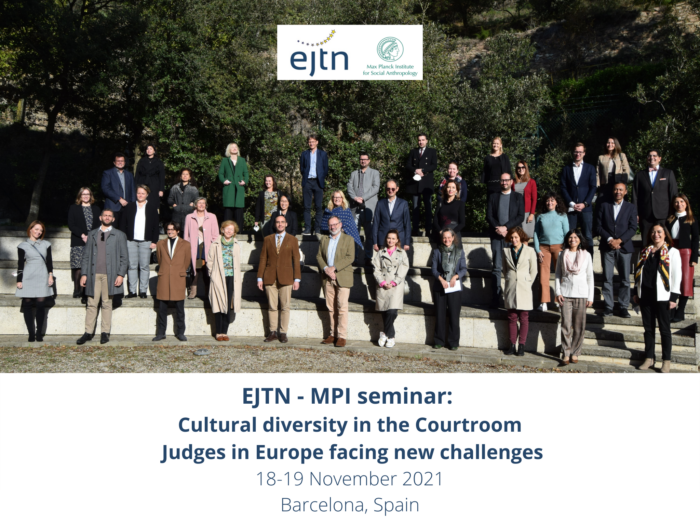
Lecture on 18 November 2021 at the
European Network of Councils of the Judiciary (EJTN) & Max Planck Institute for Social Anthropology seminar:
Cultural diversity in the courtroom – judges in Europe facing new challenges
Training Content:
This two-day training workshop aims to create a platform to address cultural (including religious) diversity and the challenges it poses to judicial institutions (prosecutors as well as judges) throughout Europe today. It follows a survey conducted among judges from 14 European countries by the (ENCJ) European Network of Councils of the Judiciary in cooperation with the Law & Anthropology Department of the Max Planck Institute for Social Anthropology (Halle, Germany). The survey revealed a clear demand for appropriate training as well as a need for cooperation with non-legal experts with knowledge of diverse sociocultural backgrounds. The training addresses these two dimensions. Guided by a team consisting of an experienced judge and an academic with the relevant sociocultural expertise, participants will discuss and intensively work on selected cases in four subject areas:
- labour law
- family law/asylum law
- criminal law
The question of accommodation of religious and cultural diversity is an integral part of the new reality of judicial practice in each Member State of the European Union, and the EJTN is the only network that undertakes organizing training to judges across Europe. Therefore, this training offers a unique opportunity to conduct comparative legal exercises and to engage in discussions among judges from different EU countries on delicate questions they increasingly face in their daily practice.
The learning objectives of this workshop are an increased awareness of and sensitivity to cultural diversity, and a comparative exploration of how this can be incorporated into judgments, leading to better legal outcomes. Participants will learn how to access relevant sources of information/expertise on issues of cultural diversity and gain familiarity with a range of techniques that facilitate reflection on cultural diversity and how it can be incorporated into individual decision-making processes. The training complements existing trainings on ‘law in context’ on a national level by providing practical exercises on how to grasp diverse lived realities and normative worldviews in increasingly plural societies. In addition, participants have the unique opportunity to directly engage with academics and to learn about the current state of social scientific research about law and diversity.
Target audience:
- target group: Judges (of all levels) and prosecutors active in labour, family, criminal and welfare law with a keen interest in questions of sociocultural and religious diversity in legal practice.
- Level: Introductory, but knowledge in at least one of the abovementioned fields of law is necessary.
- Total number of participants: max. 40
- Language regime: English
Source: www.ejtn.eu